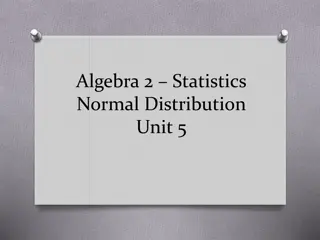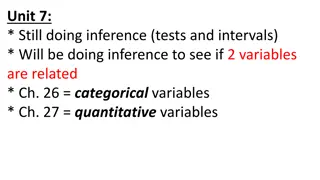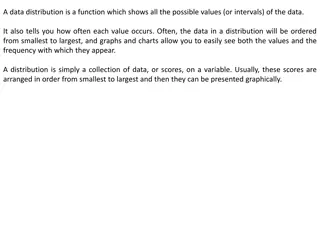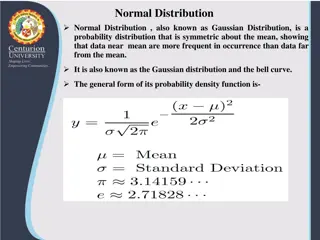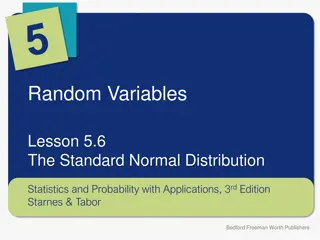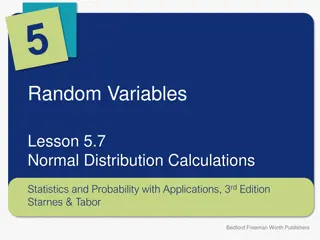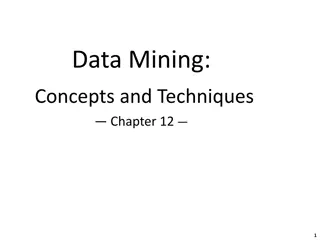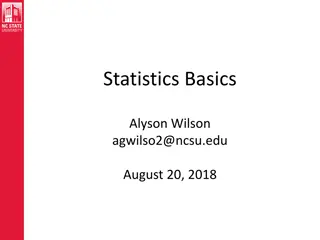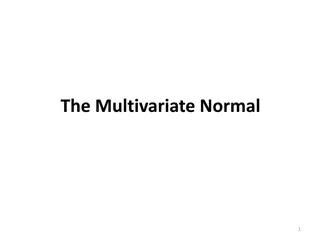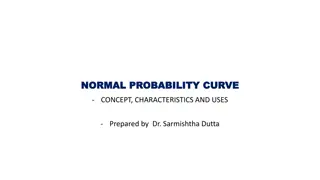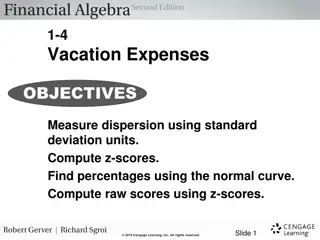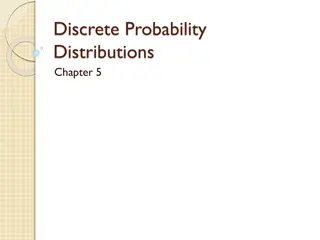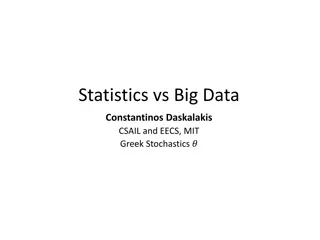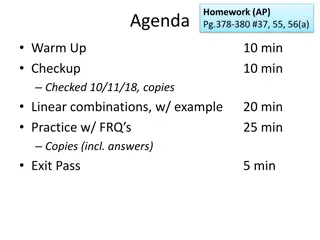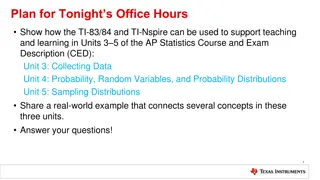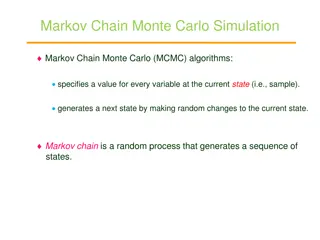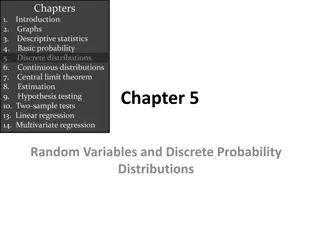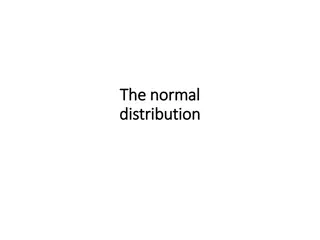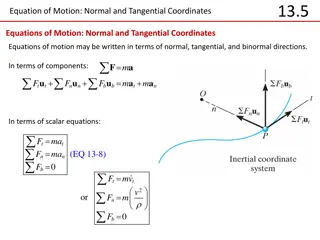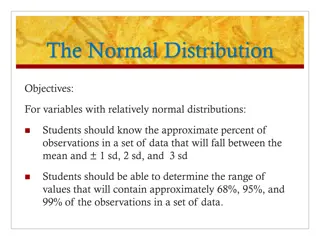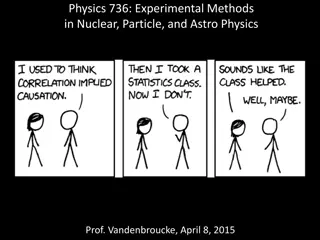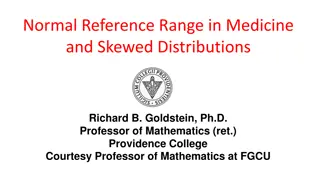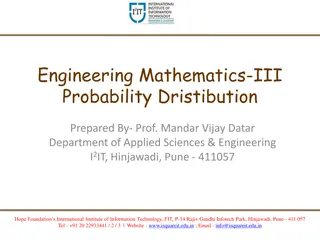Understanding Binomial Distribution in R Programming
Probability distributions play a crucial role in data analysis, and R programming provides built-in functions for handling various distributions. The binomial distribution, a discrete distribution describing the number of successes in a fixed number of trials, is commonly used in statistical analysi
14 views • 30 slides
Understanding Normal Distribution in Statistics Education
Lesson resources for teachers to teach students about analyzing and understanding normal distribution in statistics. Includes learning standards, agenda, presentation, vocabulary activities, and additional resources. Emphasizes using mean and standard deviation to fit data to a normal distribution,
10 views • 23 slides
Understanding Inference Tests and Chi-Square Analysis
The content discusses the application of inference tests to determine if two variables are related, focusing on categorical and quantitative variables. It provides examples related to testing fairness of a die and comparing observed and expected distributions of Skittles colors. Additionally, it cov
1 views • 16 slides
Understanding Normal Conditions of Use for New Propulsion Technologies in Vehicles
Explore the concept of normal conditions of use for vehicles with new propulsion/charging technologies. Learn how to assess and define normal conditions, operating modes, worst case scenarios, and overview of current technologies. Discover the approach to measure normal conditions and testing requir
1 views • 8 slides
Understanding the Significance Testing Process for Population Means
Learn how to test claims about population means, including checking conditions, calculating test statistics, finding P-values, and understanding t-distributions and degrees of freedom. This lesson covers the Random and Normal/Large Sample conditions for significance tests, the modeling of standardiz
0 views • 10 slides
Normal Flora of Human Body
Normal flora, comprising bacteria and fungi, are beneficial residents of specific body sites like the skin, colon, and vagina. These organisms, known as commensals, play a vital role in maintaining a healthy microbial balance. The internal organs are usually sterile, while different types of normal
2 views • 16 slides
Understanding Process Costing in Manufacturing Industries
Process costing is a widely used method in mass production industries like steel and chemicals. It involves accumulating costs process-wise for standardized products resulting from sequential operations. Essential characteristics include continuous production, standardized products, and handling nor
1 views • 18 slides
Understanding Data Distribution and Normal Distribution
A data distribution represents values and frequencies in ordered data. The normal distribution is bell-shaped, symmetrical, and represents probabilities in a continuous manner. It's characterized by features like a single peak, symmetry around the mean, and standard deviation. The uniform distributi
1 views • 23 slides
Understanding Normal Distribution and Its Business Applications
Normal distribution, also known as Gaussian distribution, is a symmetric probability distribution where data near the mean are more common. It is crucial in statistics as it fits various natural phenomena. This distribution is symmetric around the mean, with equal mean, median, and mode, and denser
1 views • 8 slides
Understanding the Standard Normal Distribution in Statistics
Exploring the significance of normal distributions in statistics, this lesson covers the 68-95-99.7 rule, using Table A to find probabilities and z-scores, properties of normal curves, and the standard normal distribution. Key concepts include the mean, standard deviation, and how to standardize var
4 views • 9 slides
Understanding Normal Distribution Calculations in Statistics
Exploring normal distribution calculations in Statistics involves calculating probabilities within intervals and finding values corresponding to given probabilities. This lesson delves into the application of normal distribution to determine probabilities of scoring below a certain level on tests an
1 views • 13 slides
Understanding Normal Distribution in Probability
Explore the properties and characteristics of the normal distribution, including the mode, symmetry, inflection points, and the standard normal distribution. Learn how to use standard normal tables to find probabilities and areas under the curve. Practice using examples to calculate probabilities ba
1 views • 35 slides
Understanding Outlier Analysis in Data Mining
Outliers are data objects that deviate significantly from normal data, providing valuable insights in various applications like fraud detection and customer segmentation. Types of outliers include global, contextual, and collective outliers, each serving distinct purposes in anomaly detection. Chall
0 views • 44 slides
Exploring Binomial and Poisson Distributions in Probability Theory
Understand the fundamentals of binomial and Poisson distributions through practical examples involving oil reserve exploration and dice rolling. Learn how to calculate the mean, variance, and expected outcomes of random variables in these distributions using formulas and probability concepts.
0 views • 13 slides
Understanding Basic Concepts in Statistics
This content covers fundamental concepts in statistics such as populations, samples, models, and probability distributions. It explains the differences between populations and samples, the importance of models in describing populations, and discusses various distributions like the normal and Poisson
0 views • 42 slides
Understanding the Normal Microbial Flora of the Human Body
The normal microbial flora, also known as the indigenous microbiota, inhabit various areas of the human body such as the gastrointestinal tract, respiratory tract, genitourinary tract, and skin. They play a crucial role in maintaining health and can re-establish themselves when disturbed. While resi
0 views • 22 slides
Understanding Multivariate Normal Distribution and Simulation in PROC SIMNORM
Explore the concepts of multivariate normal distribution, linear combinations, subsets, and variance-covariance in statistical analysis. Learn to simulate data using PROC SIMNORM and analyze variance-covariance from existing datasets to gain insights into multivariate distributions. Visualize data t
0 views • 16 slides
Understanding Axial Deformation in Mechanics of Materials
In the study of mechanics of materials, axial deformation is analyzed by simplifying real structural elements. This approach involves approximations that are generally satisfactory and work due to factors like allowable stress design, factor of safety, and statistical analysis of strength. Saint-Ven
0 views • 9 slides
Understanding and Managing Normal.dotm in Microsoft Word
Learn about Normal.dotm in Microsoft Word, the default template for new documents. Find out how to locate, create, modify, and deal with corrupted Normal.dotm files. Explore the importance of Normal.dotm in customizing your Word documents efficiently.
0 views • 19 slides
Understanding the Normal Probability Curve
The Normal Probability Curve, also known as the normal distribution, is a fundamental concept in statistics. It is symmetric around the mean, with key characteristics such as equal numbers of cases above and below the mean, and the mean, median, and mode coinciding. The curve's height decreases grad
0 views • 10 slides
Understanding Normal and Abnormal Behavior: Perspectives and Definitions
Normal behavior varies from person to person and society, influenced by individual preferences and societal norms. Abnormal behavior is characterized by an inability to function effectively or personal discomfort. The concept of normality and abnormality in psychology raises complex questions about
2 views • 8 slides
Vacation Expenses Analysis and Z-scores Computation
Explore the concept of measuring dispersion using standard deviation units and calculating z-scores for a dataset related to vacation expenses. Learn how to interpret z-scores, analyze normal distributions, and apply statistical concepts to real-world scenarios involving amusement park trip heights.
0 views • 18 slides
Understanding Normal Forms in Propositional Logic
Explore the concept of normal forms in propositional logic, where each formula has a unique truth-value function. Learn about equivalence of formulas, determining normal forms, and canonic forms like Disjunctive Normal Form (DNF) and Conjunctive Normal Form (CNF). Discover how to find canonic forms
1 views • 22 slides
Understanding Invariance in Posterior Distributions
Exploring the insensitivity of posterior distributions to variations in prior distributions using a Poisson model applied to pancreas data. The analysis involves calculating posterior mean and standard deviation with different Gamma prior distributions. Results showcase minimal change in outcomes ac
0 views • 7 slides
Understanding Discrete Probability Distributions
Explore the definition of random variables, probability distributions, and three types of discrete distributions - Binomial, Hypergeometric, and Poisson. Learn about the mean, variance, and standard deviation of probability distributions, as well as the difference between discrete and continuous dis
3 views • 32 slides
Understanding Chi-Square and F-Distributions in Statistics
Diving into the world of statistical distributions, this content explores the chi-square distribution and its relationship with the normal distribution. It delves into how the chi-square distribution is related to the sampling distribution of variance, examines the F-distribution, and explains key c
0 views • 23 slides
Exploring Statistics, Big Data, and High-Dimensional Distributions
Delve into the realms of statistics, big data, and high-dimensional distributions in this visual journey that touches on topics ranging from lottery fairness to independence testing in shopping patterns. Discover insights into the properties of BIG distributions and the prevalence of massive data se
0 views • 73 slides
Probability and Linear Combinations in Statistics
Delve into a thought-provoking journey of solving probability games and applying linear combinations in statistics. You will explore creating probability distributions, calculating expected values, and understanding the rules of linear combinations through engaging examples and practice problems. Di
0 views • 23 slides
Understanding Probability Distributions in the 108th Congress
The composition of the 108th Congress includes 51 Republicans, 48 Democrats, and 1 Independent. A committee on aid to higher education is formed with 3 Senators chosen at random to head the committee. The probability of selecting all Republicans, all Democrats, and a mix of one Democrat, one Republi
0 views • 34 slides
Utilizing TI-83/84 and TI-Nspire for Teaching AP Statistics Units 3.5
Explore the integration of TI-83/84 and TI-Nspire in supporting teaching and learning in Units 3.5 of the AP Statistics course, covering collecting data, probability, random variables, probability distributions, and sampling distributions. Dive into a real-world example involving the fit of lids on
0 views • 13 slides
Understanding MCMC Algorithms and Gibbs Sampling in Markov Chain Monte Carlo Simulations
Markov Chain Monte Carlo (MCMC) algorithms play a crucial role in generating sequences of states for various applications. One popular MCMC method, Gibbs Sampling, is particularly useful for Bayesian networks, allowing the random sampling of variables based on probability distributions. This process
1 views • 7 slides
Understanding Random Variables and Probability Distributions
Random variables play a crucial role in statistics, representing outcomes of chance events. This content delves into discrete and continuous random variables, probability distributions, notation, and examples. It highlights how these concepts are used to analyze data and make predictions, emphasizin
0 views • 25 slides
Understanding Normal Distribution in Statistical Problems
Explore various scenarios involving normal distributions, such as calculating probabilities, determining population percentages, estimating standard deviations, and analyzing ranges of values. Practical examples include math test scores, rattlesnake lengths, car speeds, jelly bean quantities, and mo
0 views • 29 slides
Equations of Motion in Normal and Tangential Coordinates
Equations of motion can be expressed in terms of normal, tangential, and binormal directions. The normal and tangential components play crucial roles in describing the motion of an object. Through scalar equations and component representations, these equations help analyze forces and acceleration in
0 views • 8 slides
Understanding Statistical Distributions and Properties
Statistical Process Control (SPC) involves sampling to assess the quality-related characteristics of a process. Different distributions arise in SPC, such as binomial and geometric distributions, depending on the type of data collected. These distributions help infer the current state of a process a
0 views • 16 slides
Understanding the Normal Distribution in Data Analysis
The normal distribution, also known as the bell-shaped or Gaussian distribution, is defined by the mean and standard deviation of quantitative data. It helps determine the range of values containing specific percentages of observations. Identifying frequency, probability, mean, and the relationship
0 views • 19 slides
Understanding Statistical Distributions in Physics
Exploring the connections between binomial, Poisson, and Gaussian distributions, this material delves into probabilities, change of variables, and cumulative distribution functions within the context of experimental methods in nuclear, particle, and astro physics. Gain insights into key concepts, su
0 views • 13 slides
Understanding Normal Reference Range and Descriptive Statistics in Medicine
The concept of normal reference range in medicine, determined by collecting data from a population, helps predict intervals where values are expected to fall. Descriptive statistics like mean, variance, skewness, and kurtosis provide insights into data distributions. Methods for calculating referenc
0 views • 45 slides
Understanding Probability Distributions in Engineering Mathematics-III
Explore the concept of random variables, types of distributions such as binomial, hypergeometric, and Poisson, and the distinction between discrete and continuous variables. Enhance your knowledge of probability distributions with practical examples and application scenarios.
0 views • 57 slides
Understanding Displacement, Deformation, and Normal Strain in Mechanics of Materials
Displacement and deformation in materials play a crucial role when loads are applied, leading to normal strain. This lecture discusses the concepts of displacement, deformation, and strain, covering topics such as types of strain, strain units, normal strain calculations, and the orientation of norm
0 views • 7 slides

